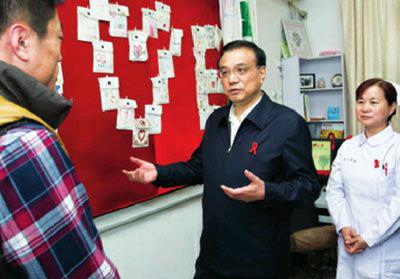Against AIDS
2015-01-12
Chinese Premier Li Keqiang visits medical workers at Beijings Youan Hospital, home to a center for HIV/AIDS treatment, on November 30, one day ahead of World AIDS Day.
The number of people living with HIV/AIDS in China had hit 497,000 by the end of October with 154,000 deaths, according to latest official figures.
Li promised more work on the prevention and treatment of AIDS and is willing to cooperate with other countries to combat HIV. Li also said the government would work to ensure HIV-positive patients access to equal employment and medical treatment, and to improve their quality of life.
Easier E-Banking
Chinas electronic banking service is required to provide easier access for the disabled, according to a set of guidelines co-issued by China Disabled Persons Federation (CDPF) and China Banking Association on December 1.
The guidelines instructed banks to promote accessibility primarily for three kinds of disabled people using e-banking services such as phone and online banking.
For visually impaired users, e-banking should provide a specially designed shortcut touch menu, active ID recognition and easy verification codes.
For deaf customers, the primary concern will be offering multiple visual facilities and instant short message services.
For the physically disabled, the bank will establish a long-distance selfservice system allowing them to open accounts from home, which traditionally requires a physical presence at the bank.
The guidelines come as a holiday gift for the 85 million disabled people in China, allowing them to avail themselves of the convenience of technology just ahead of the International Day of Disabled Persons observed on December 3 annually, said Lu Shiming, Vice Chairman of the CDPF.
Traffic Website
The Ministry of Public Security (MPS) kicked off the first nationwide traffic management website on December 2, according to a ministry announcement.
Coinciding with the countrys annual Traffic Safety Day that falls on December 2, the website www.122.cn will provide real-time traffic data to the public, especially useful for private car owners.
The website will base its data on the information collected and reported by the nations 270,000 traffic policemen and video surveillance records to ensure traffic safety.
The public can instantly consult with traffic police online and learn about traffic control, said the head of the Traffic Bureau of the MPS.endprint
The traffic department will make policy and enforcement adjustments in line with the suggestions submitted online, he said.
The website will also play a role in road safety education, giving traffic knowledge lectures and safe travel tips to the public.
There was no national official traffic information inquiry website in the past. Previously, the only option was to log onto local websites or go to the citys transport administration to inquire about records, causing inconvenience for the public and creating loopholes for information tampering.
Elderly Services
The official website of the Ministry of Civil Affairs (MCA) on December 2 published a circular to encourage foreign investment in Chinas elderly care services.
Foreign investors can set up senior care institutes for profit independently or in cooperation with Chinese enterprises, said the circular, jointly issued by the MCA and the Ministry of Commerce.
Before setting up such centers, foreign investors should submit an application to provincial-level organs in charge of commercial affairs, it said.
Foreign investors are also welcome to take part in the reform of state-run care organizations, and to develop highquality chains of institutes, it added.
Foreign investors will enjoy the same favorable tax policies and administration fee deduction policies as domestic investors, the circular said.
By the end of 2013, the population at or above 60 years of age had hit 202 million in China, accounting for around 15 percent of the total population. The figure is expected to exceed 300 million by 2025.
Smoking Ban
Beijing adopted anti-smoking legislation to ban smoking in all indoor public places, workplaces and public transport vehicles on November 28.
The draft regulation was passed by vote at a meeting of the Standing Committee of Beijing Municipal Peoples Congress. It is scheduled to become effective on June 1 next year.
According to the bill, smoking is also prohibited on the grounds of kindergartens, schools, child welfare institutions, women and childrens hospitals, fitness and sports venues, and cultural relic protection sites that are open to the public.
Tobacco advertisements are not allowed to appear outdoors, in public places and transport, nor in any form of media including radio, TV, films, newspapers, books, and Internet. All forms of tobacco promotions and title sponsorship are banned.endprint
According to the regulation, legal representatives and people in charge of government agencies, public institutions and social organizations will be given the authority to implement the smoking ban in their workplaces.
As the worlds largest tobacco maker and consumer, China has more than 350 million smokers and another 740 million people exposed to secondhand smoke each year. The population of smokers in Beijing alone exceeds 400,000.
Homegrown GPS
A Chinese company has rolled out a chip that can help smartphones access to the countrys homegrown answer to GPS—the Beidou System.
The 40-nanometer chip, developed by Shanghai Beiga Satellite Technology Co., was revealed at an exhibition event in Shanghai that promotes civilian use of military technologies.
Wang Yongping, General Manager of Beiga, said they are currently doing tests with smartphones, and they expect to begin mass production of devices with the chip in them next year, according to a report by China News Service.
The chip is a sign that Chinas independently developed Beidou System will be applied to consumer electronics field. Previously, chips using the Beidou System were too large and consumed too much power for commercial applications.
According to the company, the chip can also be used on tablet computers and wearable devices.
Jobs in the Government
Candidates prepare for examination at Nanjing Forestry University exam site in Nanjing, Jiangsu Province, on November 30.
As many as 1.4 million people have applied for government jobs this year and the figure is the lowest in five years.
Earlier reports said most positions open in government agencies above provincial level have required two years of grassroots working experience. About 10 percent of all vacancies will be set aside for college graduates who have served as village officials.
History Textbooks
Senior high school students read textbooks about the Nanjing Massacre in Nanjing, capital of Jiangsu Province, on December 1.
The textbook, entitled Warning and Thinking, was officially issued on December 1. In addition, the primary school edition, called Memory of Blood and Fire, and the junior middle school edition, Historical Truth, were also published.
To help students better understand the massacre, experts from the Education Bureau of Nanjing, the Memorial Hall of the Victims in Nanjing Massacre by Japanese Invaders, as well as a Nanjingbased publishing media group compiled these textbooks.endprint
PMI Results
Growth in Chinas manufacturing sector remained moderate in November, according to data released by the National Bureau of Statistics (NBS) and the China Federation of Logistics and Purchasing (CFLP) on December 1.
The official manufacturing purchasing managers index (PMI) slipped to 50.3 in November from 50.8 in October but remained above the 50-point mark that separates growth from contraction on a monthly basis.
Although the November PMI fell slightly, it remained above the boombust line, suggesting the manufacturing sector was generally expanding, NBS analyst Zhao Qinghe said.
The breakdown of the official PMI showed that downward pressure on domestic demand was increasing while external demand was decelerating, said Bob Liu, analyst at the China International Capital Corp.
According to Liu, temporary factory shutdowns imposed in Beijing and neighboring regions in early November to ensure cleaner air during the AsiaPacific Economic Cooperation LeadersMeeting may have helped to aggravate the slowdown in that month.
Among the sub-indices, the production index posted at 52.5, down from Octobers 53.1. The index of new orders slipped from Octobers 51.6 to 50.9 while that of new export orders fell to 48.4 in November from 49.9 in the previous month. The employment sub-index declined from 48.4 in October to 48.2.
On the other side of the equation, Chinas service sector activity slightly recovered in November. The PMI for the non-manufacturing sector rebounded to 53.9 in November from 53.8 in October, according to the NBS and the CFLP.
Tax Scrutiny
China will establish a comprehensive system to monitor foreign companiesprofitability in order to curb cross-border tax evasion, the State Administration of Taxation (SAT) announced on December 1.
The move is one of several steps against tax avoidance taken by the agency to protect the countrys interests as the worlds top destination for foreign direct investment.
The system will allow the agency to acquire profit information on foreign companies so that it can launch“targeted actions” and use information technology to prevent companies from shifting profits overseas, said Zhang Zhiyong, Deputy Director of the SAT.
The ongoing campaign against corporate tax dodging has rippled through the foreign business community in China, following the governments move to levy $140 million in back taxes on U.S.-based Microsoft Corp. Microsoft has denied that it practiced tax avoidance.endprint
Garden Expo Coming
The Tangshan International Garden Expo undergoes construction on December 4 in Tangshan, north Chinas Hebei Province. Construction for the event started from July, with a total investment of 2 billion yuan ($325 million). The main projects of the expo will be completed before October 2015.
Data Link
On December 3, Chinas Huawei Technologies Co. Ltd., a global leader company in information and communications technology (ICT), and Belgiumbased nanoelectronics research center Imec announced their strategic partnership on optical data link technology.
Their joint research on silicon-based optical interconnection is expected to deliver benefits including high speed, low power consumption and cost savings.
“This is an important next step in our collaboration with Huawei on silicon photonics. This collaboration shows that our silicon photonics research is important for advancing next-generation highbandwidth ICT solutions,” Imec President and CEO Luc Van den Hove said.
Silicon photonics is a key technology expected to revolutionize optical communications by enabling the creation of highly integrated, lowpower optical transceivers used for data transmission and telecommunications.
In 2013, Huawei acquired photonics company Caliopa, jointly created by Imec and Ghent University, thereby adding silicon photonics research to its European research and development(R&D) portfolio.
“Having acquired cutting-edge expertise in the field of silicon photonics thanks to our acquisition of Caliopa last year, this partnership with Imec is the logical next move toward next-generation optical communication,”CEO of Huawei Belgium Hudson Liu said.
Huaweis products and solutions are available in more than 170 countries, serving more than one third of the worlds population. The company currently has a staff of more than 7,700 people in Europe, 850 of whom are working in R&D.
FTZ Trial
Starting from December, businesses in Shanghais pilot free trade zone (FTZ) are allowed to open bank accounts to guarantee tax payments as local Customs authorities move to streamline clearance procedures.
The enterprises need to deposit a certain amount of funds in the accounts upon opening and have a letter of guarantee issued by a bank before they are able to make delivery of goods prior to paying tariffs.endprint
When a company transfers goods outside the zone with duty payment certificates, the bank will deduct the amount that is payable. As soon as Customs authorities confirm that the duty is paid, the bank will refund the amount automatically into the account.
The new account will cover Customs matters such as centralized declaration, exhibition, inspection and maintenance of bonded goods outside the zone and processing trade on a trial basis.
Bank of China, Bank of Communications, China Minsheng Bank, China Merchants Bank and the Bank of Shanghai are the first batch of banks to operate such accounts for FTZbased businesses.
Better Connection
Construction of a tunnel for the Zhijin-Nayong Railway in Guizhou Province is in full swing on December 2.
Merger on Track
Chinas two largest train makers, China CNR Corp. and CSR Corp., have submitted the first draft of their merger plan to the State Council, Chinas cabinet.
CSR will buy all CNR shares through a secondary public offering, and the latter will delist from the capital market, 21st Century Business Herald reported on December 3, citing anonymous sources at the State-owned Assets Supervision and Administration Commission of the State Council.
The new company will be named China Railway Vehicle Corp, the report said.
On October 27, CSR and CNR said that they were preparing for a major development. Their shares were suspended from trading in Shanghai and Hong Kong at the same time.
The merger will create a new train manufacturing giant, which is expected to hold assets of more than 300 billion yuan ($48.74 billion).
According to official statistics, the two corporations hold the lions share in the worlds high-speed train market, with total sales revenue equal to that of the rest of the worlds top five makers combined.
Cloud Computing
Chinas leading smartphone maker Xiaomi Corp. and software company Kingsoft Co. Ltd., both co-founded by Chinese billionaire Lei Jun, announced on December 3 that they would invest$222 million in 21Vianet Group Inc., the largest carrier-neutral Internet data center service provider in China.
Kingsoft will take an 11.6-percent stake in 21Vianet as a result of the transaction, while Xiaomi will take 3.4 percent. Temasek Holdings, the Singaporean Governments investment arm, also agreed to pour $74 million into 21Vianet.
Teaming up with a major local cloud computing provider will enable Lei to put more mobile services on smartphones made by Xiaomi and software products developed by Kingsoft.
“The 21Vianet investment is one of the key steps in Kingsofts cloud strategy for the next three years,” said Lei, who serves as chairman of Kingsoft. “We believe that cloud services will be the critical breakthrough for the company.”
Xiaomi is the second largest smartphone vendor in China by shipment at present, closely following South Korea-based Samsung Electronics Co., said research company Analysys International.endprint
